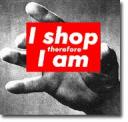 Printed below is an excerpt from the website ChangeThis, and specifically this essay which was written back in 2004.
Printed below is an excerpt from the website ChangeThis, and specifically this essay which was written back in 2004.
The desire by too many of us (I say us because we all are part of this mess we call an economy) to have more than enough has led to too many not having enough to maintain the abundance they were so proud of, despite their reality of not enough.
Now they want to be bailed out of scarcity, because it is someone else fault.
I’ve bolded below what could have very well been a prophetic statement, written back when the DOW was well over 10K and 20K was talked about.
You should know that this was written as a profile of a company that makes stuff, albeit good stuff.
In an economy of abundance, there is enough. Not too much. Not too little. Enough. Most important, there is enough time for the things that matter: relationships, delicious food, art, games and rest. Many of us in the United States live in what is thought to be abundance, with plenty all around us, but it is only an illusion, not the real thing. The economy we live in is marked by “not enough.” We once asked the owner of a successful business if he had enough money and he replied, “Don’t you understand? There is never enough.”
We don’t have enough money, and we also don’t have enough time. We don’t have enough energy, solitude or peace. We are the world’s richest country, yet our quality of life ranks 14th in the world. As Eric Hoffer, a mid-20th century philosopher, put it, “You can never get enough of what you don’t really need to make you happy.” And while we work harder and harder to get more of what we donʼt need, we lay waste to the natural world. Dr. Peter Senge, author and MIT lecturer, says, “We are sleepwalking into disaster, going faster and faster to get to where no one wants to be.”
We might call this economy, the one we live in, the economy of scarcity. Lest you think the economy of abundance is gone with the old Chumash, consider Europe. Europeans still buy only a few well-made clothes and keep them for many years. Their houses and apartments tend to be smaller than ours; they rely on public transportation, and small, efficient home appliances and cars. Europeans enjoy a 25 percent higher quality of life than Americans (while we consume 75 percent more than they do). Or, look at the people of Bhutan, whose king insists on measuring “gross national happiness.”
Any person or nation can grow fatter and fatter, richer and richer, sleepwalking toward disaster. Or we can choose to remain lean and quick, wealthy in beauty and time and, that word that inspired our forefathers, wealthy in happiness.
2 Responses to “Is it enough?”
Leave a Reply
You must be logged in to post a comment.










November 10th, 2008 at 12:09 pm
now how to get the rest of the nation to read and ponder this…
November 10th, 2008 at 5:17 pm
Great post Kendall. You already know how I feel about this, especially now that it’s snowing.
See you Friday!